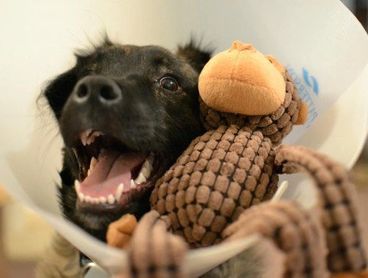Why you should spay your pet
- Spaying refers to a surgical procedure that renders female dogs and cats incapable of reproducing.
- A spayed animal will not exhibit any further heat cycles, nervousness and desire to breed is terminated.
- If you spay your female dog or cat before their first heat, you will greatly reduce the chance of her developing mammary cancer later in her life.
- Spaying also protects the dog or cat from uterine infections and the possibility of pregnancies.
- As spaying will stop reproduction, your pet will not breed, and therefore the number of pets euthanized will be reduced.



Why you should neuter your pet
- As a rule, neutering refers to the surgical procedure that renders male cats and dogs incapable of reproducing.
- Unneutered male dogs and cats tend to stray in search of females in heat. Neutering will curtail this unwanted behavior.
- Neutering will reduce sexually transmitted diseases, lessen wandering and the chance of being hit by cars and decrease the number of dog and cat fights.
- The male “marking” behavior is greatly reduced in pets that are neutered. Male cats will seldom spray furniture, walls, etc., with urine when neutered. Neutering has been shown to reduce aggressive behavior in dogs and cats.
- Neutered male animals rarely develop prostatic hyperplasia (enlargement) or prostatic cancer and they cannot acquire testicular tumors.
- As neutering will stop reproduction, your pet will not breed, and the number of pets that are euthanized will be reduced.
Feral Cat Colonies
When efforts to offer low-cost spay and neuter services to residents of Simi Valley who were in financial need began, the existence of several feral cat colonies were identified. A program for trapping, spaying or neutering, and returning the altered cats to their existing colony was enacted. All known colonies were investigated in an effort to determine their size, the population make-up, and the condition of the animals.
An aggressive but humane trapping campaign took place. This involved numbers of volunteers setting feline traps in the colonies during the evening hours. The traps were baited with canned cat food or fresh chicken. Catching all the residents of the colonies, which is critical, took the volunteers hours and hours, and night after night of climbing and crawling through bushes in the area.
Not all cats will enter traps, no matter how tempting the bait, especially if they have access to dumpsters or other food sources.
The ingenuity of the volunteer crew resulted in the building of a “super trap,” measuring 4 ft. x 4 ft. x 8 ft. This trap was so large that the cats did not feel threatened when entering. To entice the cats into the trap special bait was needed. A volunteer’s pet rat, which was totally accustomed to cats, was used. Placed inside the “super trap,” in a cat proof cage, Roxy the Rat was irresistible and successfully lured all remaining cats into the trap. At the veterinary clinic all the trapped cats were leukemia tested, vaccinated against FVRCP and rabies, spayed or neutered, and their right ear was tipped for future identification. Kittens young enough to be socialized were placed with volunteer fosters and adopted out after spay/neuter surgery.
To eliminate a problem colony site, which had become a dumping ground for unwanted pets, cats from the particular colony were relocated to local sanctuaries. Cats from the other colonies were returned after recovery to their colony area to live out their lives. Studies have estimated that colony cats have a life span of approximately two to five years, so colonies will naturally cease to exist over time. This requires constant monitoring of the colony site to ensure no new unaltered animals arrive to continue breeding. Many feral cats were trapped in resident’s backyards, where they were accustomed to being fed. In some cases a trap was provided at no charge to the resident, who with guidance, undertook the trapping and transporting of the feral cat themselves.

